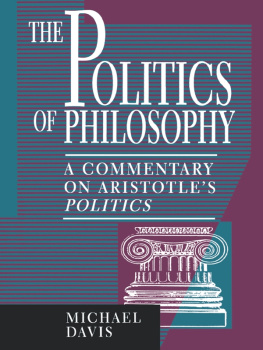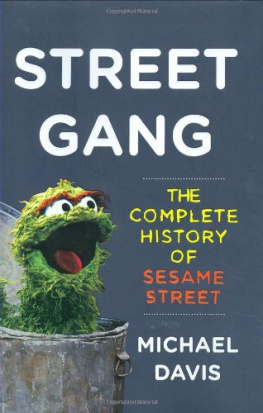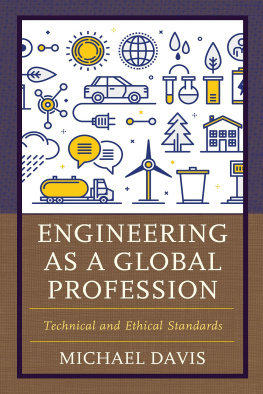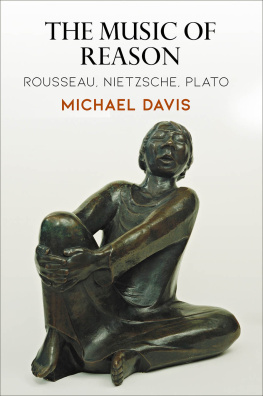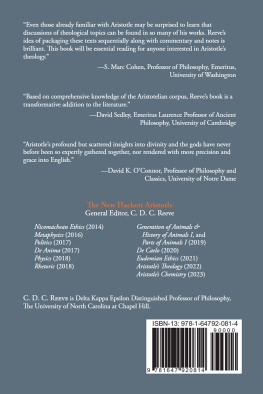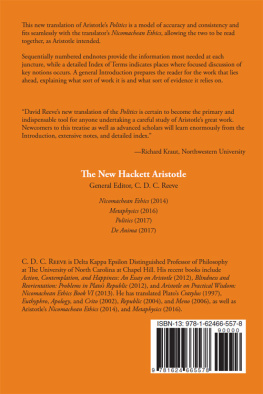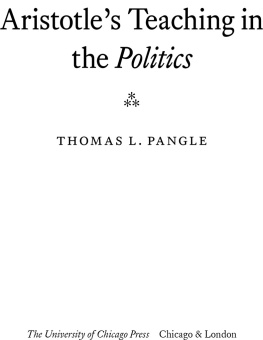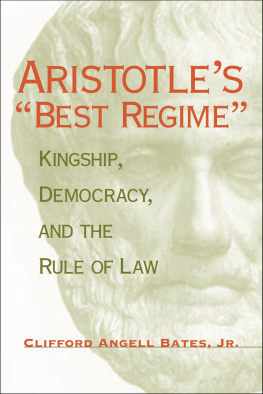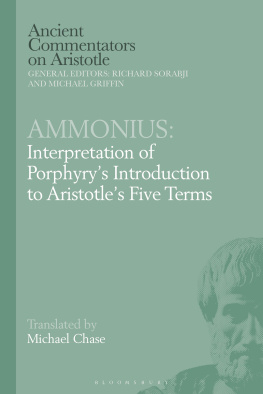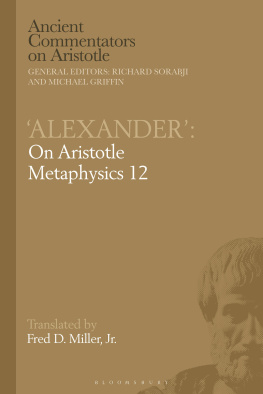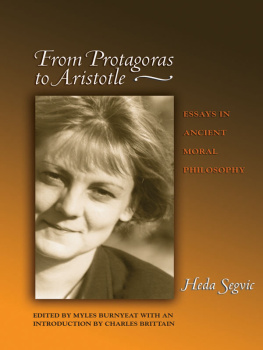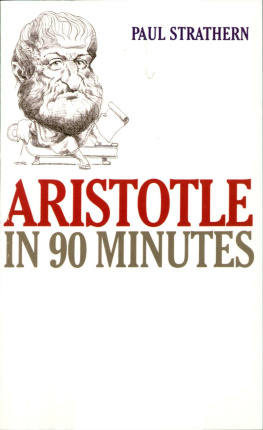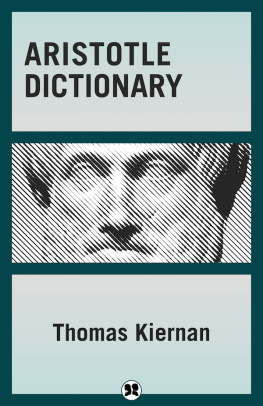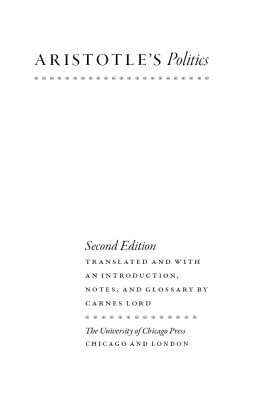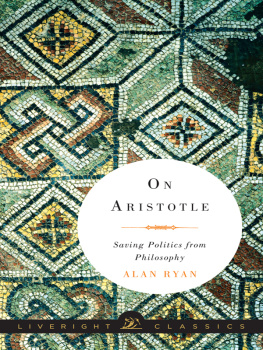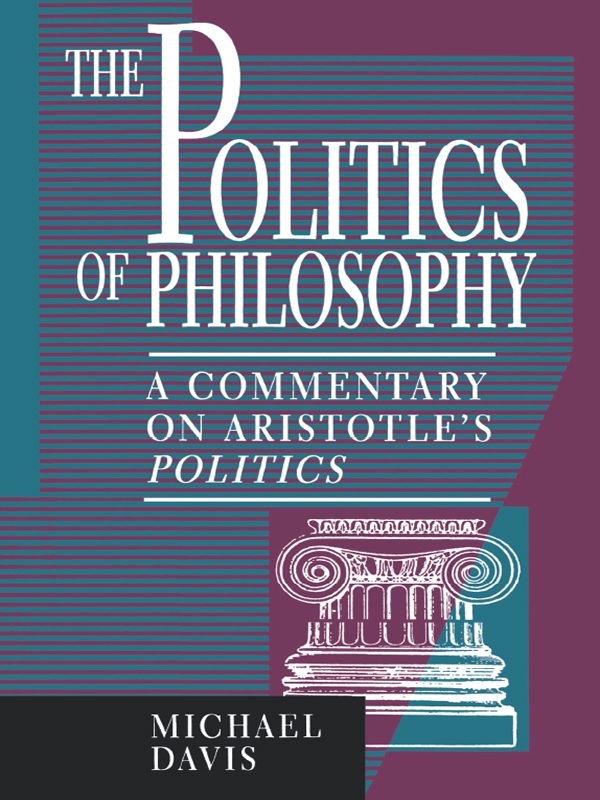In the Poetics (1457b36) Aristotle uses the word for sovereign, kurion , to describe what turns out to be one of two fundamental aspects of all logos the ordinary. It is paired with the foreign. See also my Aristotles Poetics : The Poetry of Philosophy (Savage, Md.: Rowman and Littlefield, 1992), 111-28.
This dyad is connected to a variety of others. In Book 1 it will underlie the division of the household into slave and free, the double treatment of nature as teleological, and the double account of the art of acquisition. In Book 2 it will be at the root of the tension between political knowledge and political practice. In Book 3 it shows itself as the tension between poverty and wealth that ultimately leads to the tensions between the rule of law and the rule of the pambasileus the all-powerful kingand between philosophy as a model for political life and philosophy as an element of political life. In Books 4 and 6 the dyad is connected to oligarchy and democracy as the elements of all political life, and in Book 5 to the negative determination of the polis. In Books 7-8 it is linked to the double accounts of virtue and of education. The list could easily be extended. To see how far-reaching the implications are of the distinction made at the outset of the Politics, one need only mention the similar dualism in the Metaphysics, where a comprehensive or democratic understanding of being as being is played off against a hierarchical account of being as the highest being.
See Platos Phaedrus 230d.
Compare 1324b39-1325a1: ... just as one ought not hunt human beings for a feast or a sacrifice but what is to be hunted for this, and whatever wild animal may be eaten is to be hunted.
Compare the beginning of Book 8 (1338b2030) on cannibalism and murder as the signs of barbarism and also Nicomachean Ethics 1143b2025.
Compare Nicomachean Ethics 1161a31b11 where Aristotle makes clear that neither friendship nor justice is possible between master and slave.
Aristotle nevertheless hints at what is to come in the examples that accompany the first statement of nature as teleological. It is curious that he mentions three natural classes to which we are meant to compare the polis : man, horse, and household ( oikia ). We are led to wonder whether men are like horses, presumably ends in themselves, or like households, which cannot be what they are apart from their completion in cities.
Compare Book 3 (1288a2530) on the pambasileus understood as the whole of which the other citizens are parts.
Compare this with the critique of Plato in Book 2, especially 1261a17 21.
That Aristotle is aware of this difficulty even in the Nicomachean Ethics becomes clear if one considers the manner in which the multiplicity of goods suggested by the first part of the first sentence of the book is undermined by the introduction of the good in the second part of the sentence. The good becomes the ergon of the goods, and they thereby cease to be energeiai.
Compare 1252a18.
The first sentence of every book of the Politics after Book 1 contains the word politeia. See Leo Strauss, The City and Man (Chicago: Rand McNally, 1964), 45.
This repeated division into three is made clear in Harry V. Jaffas analysis of Book 2 of the Politics (although he does not make its significance explicit) in his Aristotle in Leo Strauss and Joseph Cropsey, eds., History of Political Philosophy (Chicago: Rand McNally, 1963, 1972), 80-94.
See Aristotles De Caelo 268a8-29 and Strauss, The City and Man, 17-22.
See Strauss, The City and Man, 18.
See Strauss, The City and Man, 22.
Aristotle divides the objects of desire into threethe necessary, the superfluous, and pure pleasure unmixed with pain. Stasis can arise from any of the three. The cure for the first is a minimum amount of property and work, for the second moderation, and for the third philosophy.
This is confirmed by Aristotles use of idion and words cognate with it in Chapter 12.
See, for example, Nicomachean Ethics 1099a31b8.
There is an additional wrinkle in the division. Aristotle divides each of the last two categories into two. So they either legislate (or legislate and craft a regime) in their own cities or in foreign cities. At the very least what Aristotle has done is to make it impossible to consider his final division a straightforward division into three. Is this his escape from the mistake of Hippodamus?
See note 17 above.
See 1274b33-35 and 1276a5b15.
For they dispute, some saying the city to have done [acted] a deed [action], but some [saying] not the city but the oligarchy or the tyranny. (1274b33-35)
Forms of aporia, aporos, and apore occur at least twenty-nine times in Book 3.
But we see that all the activity ( pragmateia ) of the statesman ( politikos ) and of the legislator is about the city, and the regime is an order of those making the city their home. But since a city is one of the composite things, like any other whole put together and from many parts, it is clear that the citizen must first be sought. (1274b35-40)
Book 3, as a whole, has the following structure:
- Introduction: chapter 1 (1274b321275a1)
- Who are the citizens?: chapters 1-2 (1275a11276a5)
- When is a city the same?: chapter 3
- The extremes of citizenship: a. Good menchapter 4 b. The vulgar/slaves/etc.chapter 5
- The forms of regime: chapters 6-8
- Various illegitimate claims to rule based on misunderstandings of justice, or the deviant regimes: chapters 9-11
- Justice: chapter 12
- Legitimate claims: chapter 13
- Kingship as the hardest case: chapters 14-18
This is connected to the distinction present in the language of Aristotles argument between what is said and what is true. See, for example, 1275a28-30, 33, 1275b3, 18, 1276a3, 6, and 15, although it must be said that this sort of language is very common for Aristotle.
Compare 1313a1416.
Compare this with Glaucons demand at the beginning of Book 2 of the Republic that justice be good, independent of appearances. Socrates responds first by setting up a city in which there is no distinction between appearance and reality and then, once this city has been corrupted, by trying to restore it to health by closing the gap between appearance and reality. Aristotle too sees that this claim to close the gap between what things are and what they are called is the paradigm for all politics. In neither case, of course, does this mean that they think such a restoration is really possible.
Nicomachean Ethics 1277b30.
Aristotle elsewhere denies the special status of oligarchy and democracy, although it is interesting that he devotes so much attention to both in Book 4 and especially to democracy in Book 6.
And indeed, what has been sought in the past and now and ever, and what is always puzzling ( aporoumenon )What is being ( on )?is this: What is substance ( ousia )? Metaphysics 1128b26.
In Book 3, at least, oligarchy is sometimes allowed to stand for hierarchical rule of any sort. See, for example, 1281a3034.

